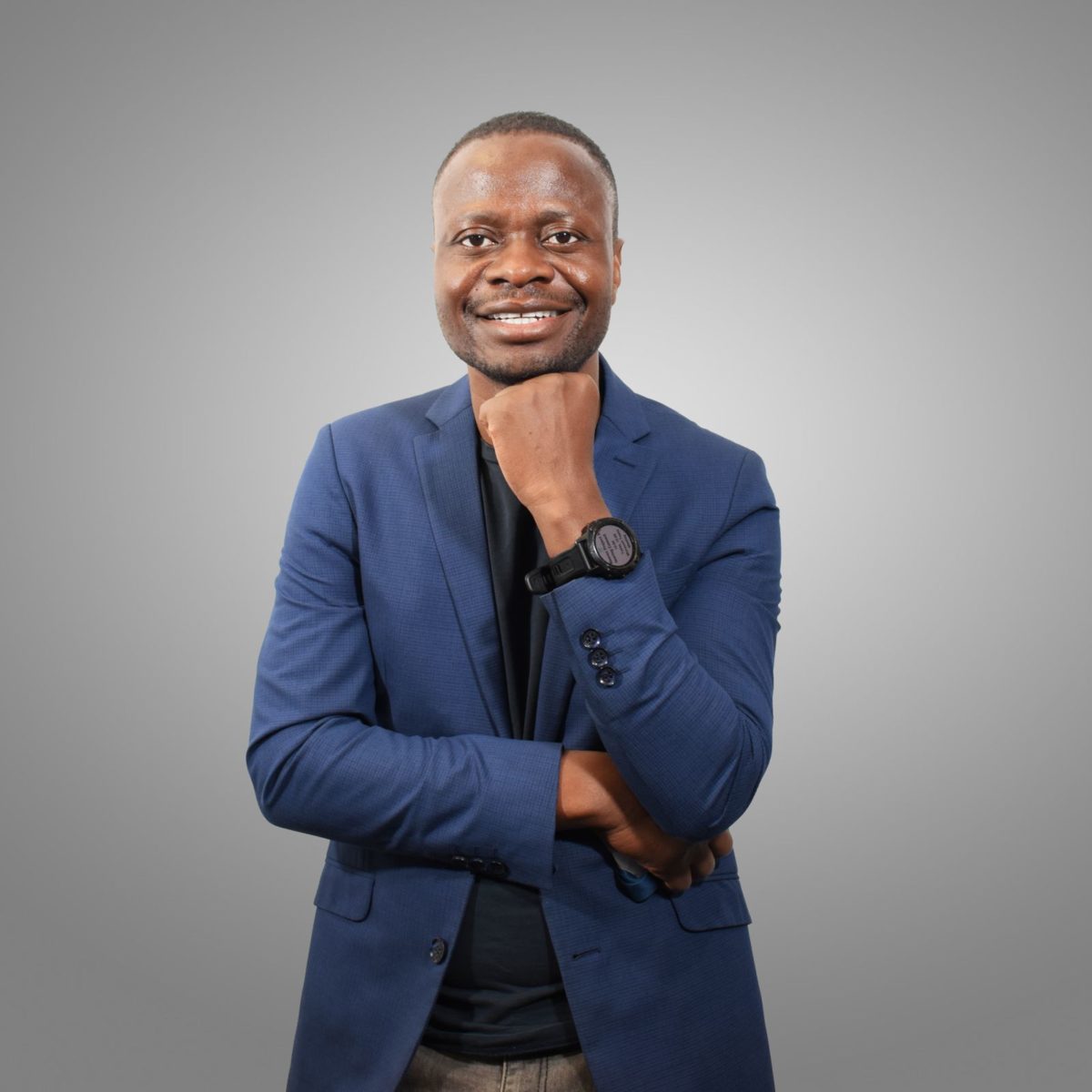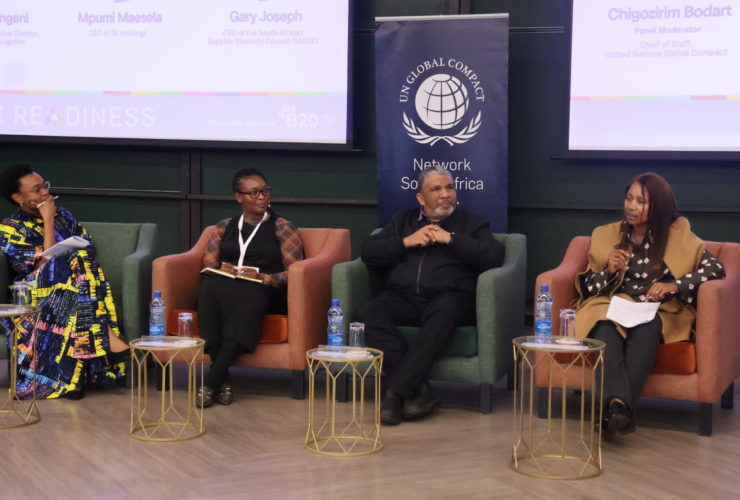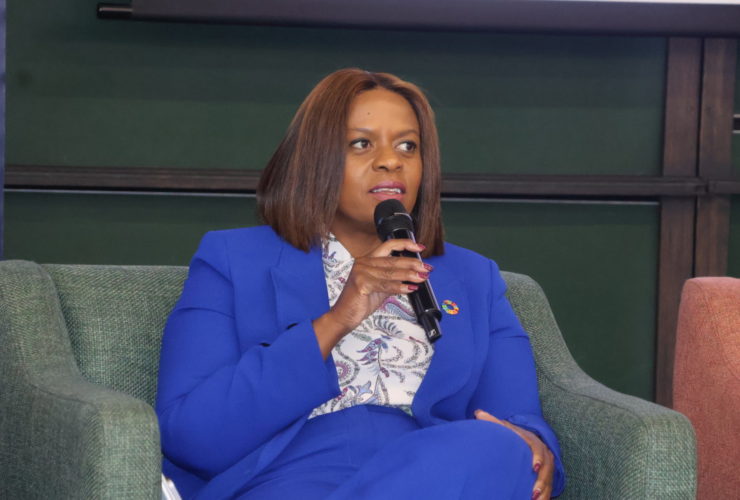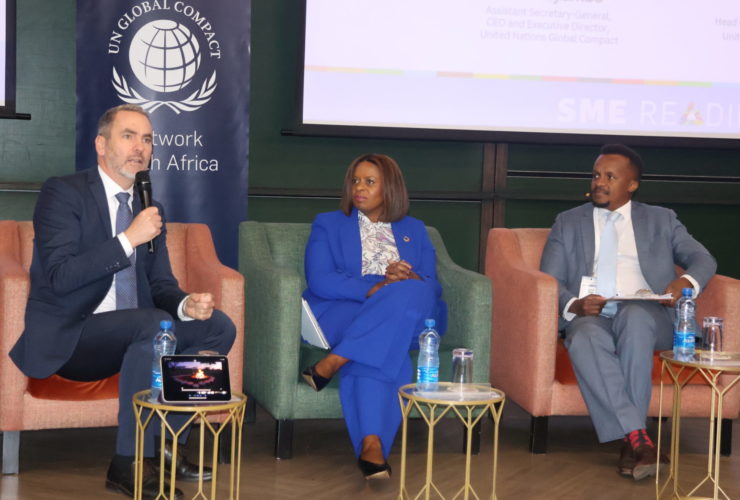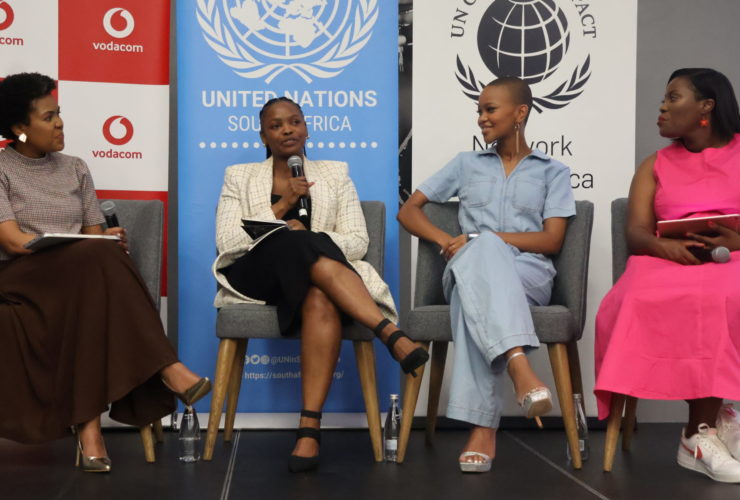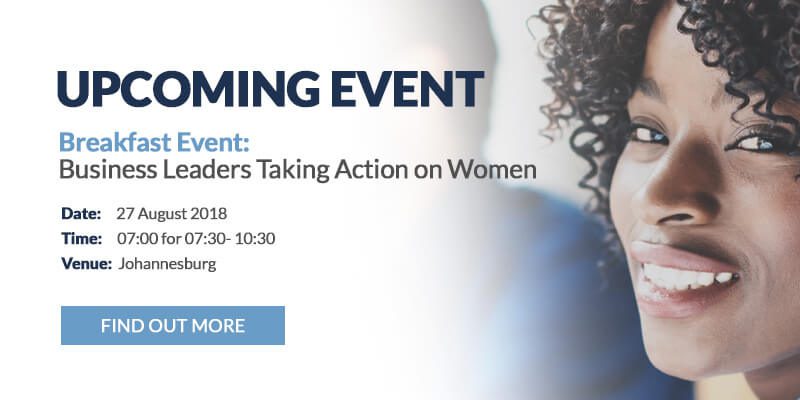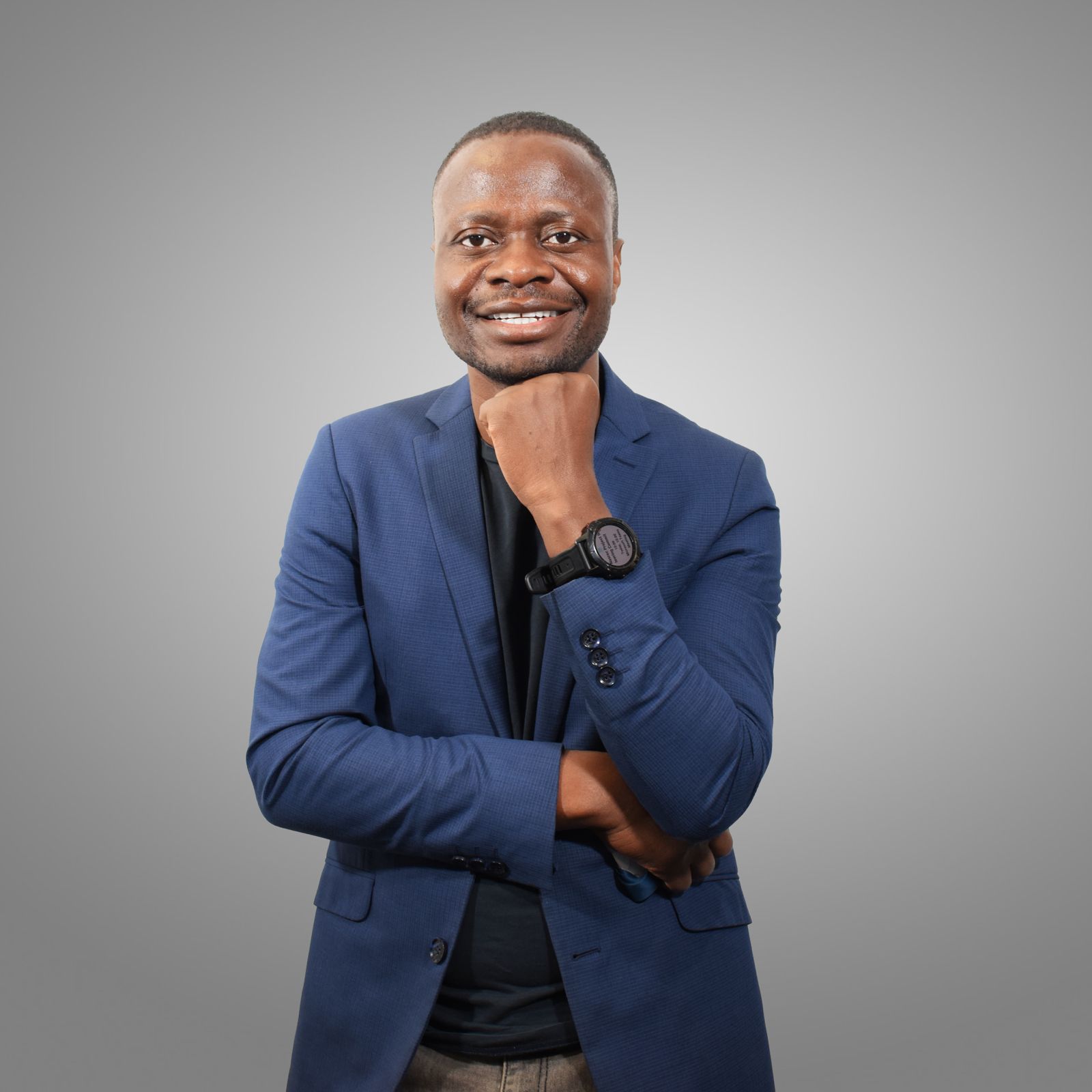
Dr. Sydwell Shikweni
Vice-president for transformation at Merchants,
Tell us about your remarkable path to becoming an SDG Pioneer?
I am truly honoured to be recognized for my work in advancing sustainability. My journey in this field began with a growing awareness of the urgent challenges we face as a society, especially regarding climate change, gender equity, quality education, decent work, to mention but a few. These issues resonated deeply with me and fuelled my commitment to making a positive impact.
My journey in driving positive impact through on sustainability to becoming 2024 SDG Pioneer SA has been both rewarding and transformative. I pioneered the Sustainability Journey for Merchants out of passion for what I do, yet I did not have much knowledge and experience in the area. It started with some research and an unwavering commitment to learning, recognising the sense of urgency in addressing sustainability issues in our world. I acknowledged that I need to equip myself with the required knowledge, skills and competencies in this area. I made it a priority to learn quickly and adapt, which led me to register for and complete a Global Leadership Programme for Sustainability in Africa, at United Nations University. This learning experience has been valuable in providing me with a solid foundation on the principles of sustainability and equipped me with practical tools to implement the SDG goals.
I leveraged the synergy that exist between transformation in SA context, the Safety, Health and Environment, and the SDG Goals – catalyst for economic transformation. Ultimately, my path to becoming an SDG Pioneer has been shaped by a blend of rapid learning, collaboration with speers, key stakeholders, and a steadfast commitment to sustainability. It has been inspiring to see the positive impact of our initiatives, and I remain committed to solving the world’s biggest challenges, to be part of the global success story in this area and driving further progress towards a more sustainable future.
In particular, explain the work for which you are being recognized and how you developed a strong interest in this field?
I have been recognised for pioneering the Merchants Sustainability Journey which has substantively a significant impact on the advancement of SDG goals. I lead the sustainability journey which is cerebral, delivering strategic and commercial value benefits to Merchants, while also contributing to our clients, suppliers sustainability efforts and broadly benefiting the country as a catalyst to addressing the socio-economic growth.
I have developed and implemented a comprehensive ESG Strategy aligned to global best practice (Sustainable Development Goals, and the UN Global Compact) ensuring that our efforts contribute to the sustainability of our clients, suppliers, communities and the broader global objectives. I have aligned our business to track and measure our carbon footprint and drive initiatives to become carbon neutral by 2030 in our operations and by 2040 across the value chain, including tracking and improving on material scope 1, 2 and 3 contributors such as fuel, energy, buildings and data emissions. Building climate resilience and pursuing nature positive strategies in our host communities through greening our facilities, in support of climate risk mitigation and biodiversity protection (including initiatives such as water harvesting, waste
recycling, and planting of trees and greenery, work from home, paperless office environment, focus on skills development, gender equity, community economic development and aligning with environmental sustainability by promoting green skills and sustainable practices (with SDG 13 – Climate Action, SDGs 4 – Quality Education, 5 – Gender Equity as the primary focus). To this effect, the company participate in the UN Global Compact flagship programmes including the Young SDG Innovators Programme, an sustainability programme has been design, and being rolled out to the business the entire business. Building strategic partnerships with organisations with a similar focus, among others, Social Coding SA to drive digital, robotic, coding skills and engaging youth in rural schools in green skills, through their innovative ideas and solutions for climate challenges in the context of sustainable development.
Pioneered the establishment of the Merchants Academy, launched in October 2021. This provided a sustainable skills development strategy for the company and community training. To date, the Academy has triple accreditation with the Services SETA, MICT SETA and QCTO as well as 11 flagship qualifications and over 200 of skills programmes, over 10 000 learners’ throughput achieved, towards a target of 50 000 by 2026. Cross Skilling Project, in 2021 with over 300 candidates from hospitality industry impacted by covid-19 trained and integrated into our business. Awarded a significant grant in April 2024 from Jobs Fund (National Treasury’s Initiative) to the tune to train 3000 learners (unemployed youth), with an undertaking to place 2000 over a 2 year period.
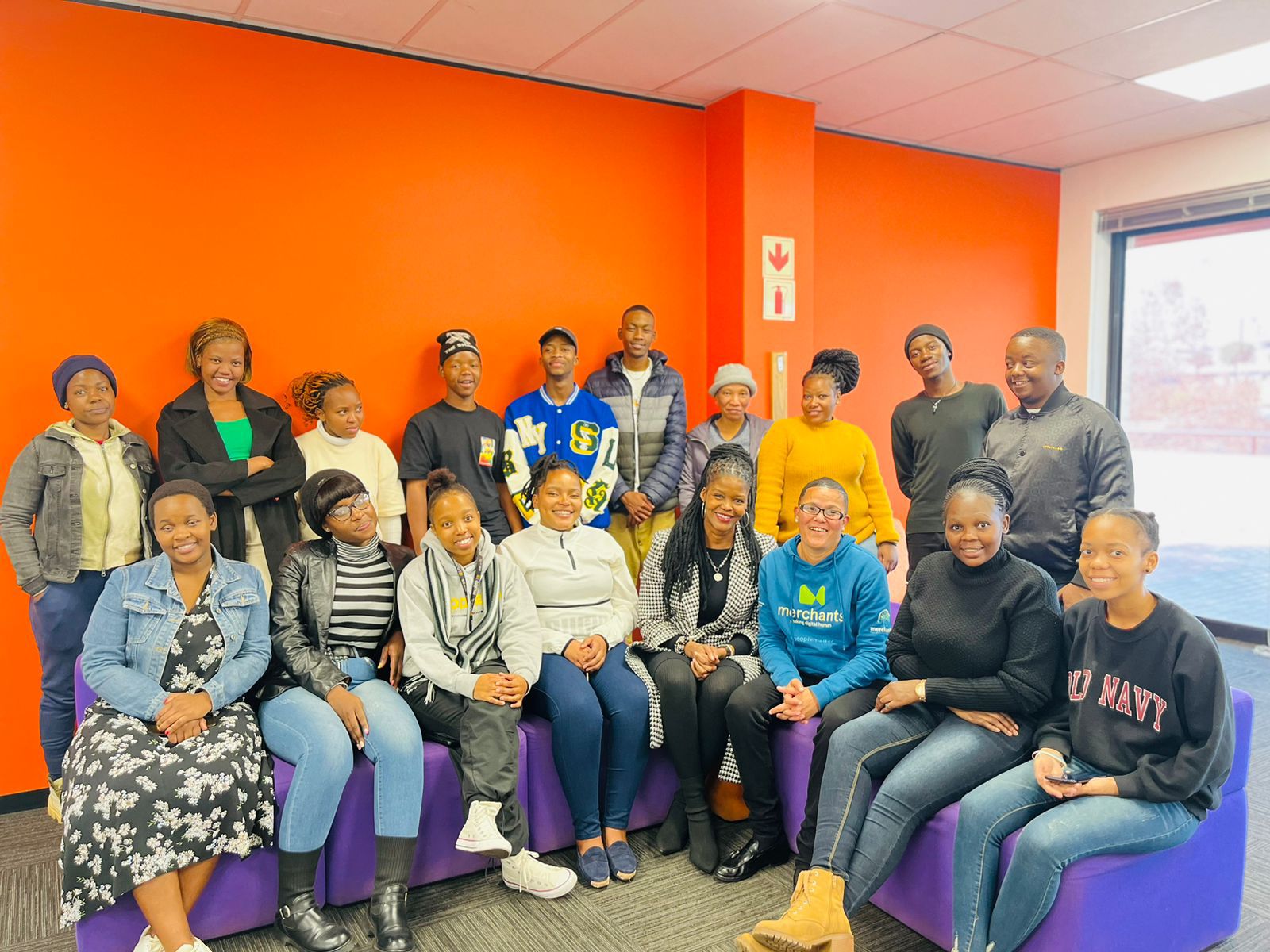
Pioneered the establishment of the first Contact Centre Operation in Township – Soweto, Jabulani launched in October 2022. This is a community driven initiative with demonstratable socio-economic impact as it stimulates localisation and jobs creation. This translated into net new Jobs for youth closer where they reside, tapping into local talent Improving employees well-being, reducing their travel time, travel cost, talent retention, low attrition and absence and stimulating local entrepreneurship.
The impact on the creation of sustainable and meaningful future focusing on youth employability and job creation. Signed up with YES4Youth as an Implementation Partner enabling the employment of over 500 young people through the programme, providing them with valuable work experience and skills development opportunities, with 100% absorption. This initiative supports SDG 4 (Quality Education) and SDG 8 (Decent Work and Economic Growth).
I established a robust governance structure, sustainability committee and trained champions within our organization has been crucial to embedding sustainability in our culture.
Your story is an inspiration to us all, so please share with us the steps you took to make a positive impact on our world?
One of the first steps I took was to develop the ESG strategy and integrate sustainability within our business as one of the strategic focus areas. This strategy focused on integrating sustainability into our operations, ensuring that environmental, social, and governance considerations were at the forefront of decision-making.
I understood that for any initiative to succeed, it had to be embedded in our corporate culture and strategy. To build a culture of sustainability, I introduced mandatory ESG training for all employees. This initiative focused on equipping our team with green skills and knowledge about sustainable practices, empowering them to contribute actively to our goals.
I prioritized engaging with both internal and external stakeholders. Understanding their perspectives helped shape key initiatives and fostered a sense of ownership. In particular, executive support was crucial in this journey. Fortunately, working with visionary leaders who believe in dreaming big and setting the path for doing great, I had all the support I needed to kick
start the sustainability journey for the business. Gaining commitment from leadership not only provided the necessary resources but also sent a clear message that sustainability was top priority throughout the organisation.
I also recognized the importance of collaboration, which led me to partnering with industry experts, fostering knowledge exchange and sharing experiences with peers. Guided by the industry experts, together, we assessed our sustainability practices, identified the gaps and we set science-based targets that were stretching yet achievable, ensuring that our efforts were grounded in data and research. This collaboration enabled me to identify innovative solutions and common pitfalls to avoid while fostering an environment of continuous improvement and collective learning.
We developed partnerships with local organizations to address pressing community needs, such as education and environmental conservation. These initiatives not only provided direct support but also created opportunities for our employees to volunteer and engage with the community.
Monitoring our progress was essential for accountability and transparency. I emphasized the importance of tracking our progress and measuring the impact of our initiatives. I established a robust system for tracking our impact, allowing us to celebrate successes and adjust strategies as needed thus enabling continual improvement. This commitment to rigorous monitoring reinforced our dedication to making a tangible difference.
Signing up with the UN Global Compact and the UN Global Women – Women Empowerment Principles was a significant milestone in this process, as it enabled one to align and benchmark our goals with global best practices and enhanced our credibility in the sustainability space. Integrating the UN Global Compact principles within Merchants was great step toward contributing to the achievement of the Sustainable Development Goals (SDGs). It started with familiarize ourselves with the Ten Principles of the UN Global Compact, which cover human rights, labour, environment, and anti-corruption, as these provide a framework for responsible business practices. This was followed by identify the SDGs most relevant to our business and how they relate to the Global Compact principles. This alignment assisted in focusing our efforts and measure our impact effectively.
These steps not only contributed to our organizational success but also created a ripple effect within the communities we serve. Witnessing the positive changes and knowing that we’re making a difference in people’s lives has been the most inspiring aspect of this journey. Together, we can continue to create a more sustainable and equitable world.
Please share some challenges and battles you’ve encountered while pursuing your SDG ambitions?
Pursuing my ambitions related to the Sustainable Development Goals (SDGs) has certainly come with its share of challenges.
In a competitive landscape, prioritizing sustainability initiatives often means navigating tight budgets and justifying investments in long-term goals. Our limited budget meant that we could not go beyond the budget provisioned to implement sustainability initiatives. Developing business case highlighting how sustainability can lead to cost savings, improved employee engagement, enhanced brand reputation, and market penetration as most companies take sustainability criteria into account when making purchasing decisions, demonstrated return on investment enabled seamless approval of additional budget required.
Managing failure in some few instances where initiatives have not yielded the intended results first time. For example, in partnering with some suppliers, and empowering SMMEs in our sustainability journey, I had some share of disappointments where some failed deliver up to the
expected standard. I always took full responsibility for the outcomes, whichever way they are and be resolute to get better in learning and course correction measures.
Internally, there was sometimes resistance to change, particularly from those who were unsure about the implications of adopting new practices. To tackle this, I have engaged and implemented comprehensive training programmes and created forums for open dialogue, allowing employees to voice their concerns and understand the benefits of our sustainability efforts.
In the world of sustainability, I have find it challenging to choose the right framework for sustainability reporting to satisfy diverse stakeholders interests. I came to realise that different frameworks serve different needs, and adopting all the frameworks can be daunting. For this reason, I find that choosing the framework that aligns best with the organisational goals and that of its key stakeholders is imperative following an adaptive approach is important. It is adaptive organisations which embed a learning culture that create an agile teams to best satisfy the needs of its diverse stakeholders.
Externally, navigating stakeholder expectations—ranging from clients to local communities—required transparency and consistent communication. Engaging with stakeholders through regular updates and collaborative initiatives helped build trust and encouraged them to support our goals.
Each of these challenges has been a learning experience, reinforcing my belief that with resilience and a collaborative spirit, we can overcome obstacles and make meaningful progress toward our SDG ambitions.
Accomplishments: As part of your SDG journey, what stands out as the most rewarding?
As part of my journey toward the Sustainable Development Goals (SDGs), several experiences stand out as particularly rewarding.
· Providing young innovators within Merchants and the rural schools from Limpopo the space to exercise their dynamism to lead in providing practical solutions in addressing top challenges on the SDG Goals. Introduced over 500 High School learners from rural Limpopo schools to Sustainability through our annual Play for Good Robotics Competition. Innovative solutions on Sustainability from young minds focusing on SDG Goal 13, provides a sense of confidence that the future will be in good hands with the most informed generation who best understand the interconnected world. In the words of Coffee Anan “Any society that does not succeed in tapping into the energy and creativity of its youth will be left behind.”
· The Township Hubs is one of our business strategic focus areas. This is a community driven initiative with demonstratable socio-economic impact as it stimulates localisation and jobs creation. We have branded the initiative ‘Sisekhaya’ meaning we are home. Merchants has built a Township Hub in Soweto where youth are introduced to the world of technology servicing multichannel and complex customer solutions, have a co-pilot Digital Skills Hub (DDSH) in Dundee, a Tier 3 town in KwaZulu Natal, with another township hub planned for later this year in Alexandra. The company is set to establish 10 operational hubs in townships throughout South Africa, creating thousands of direct jobs and creation of SME’s to stimulate the circular economy – this will ultimately help the company achieve its goal of 40% impact sourcing and training 50 000 youth by 2026.
· One of the most significant milestones was signing up with the UN Global Compact. This commitment not only aligned our organization with global sustainability principles but also provided a framework to drive meaningful change, and annually review our standing through the communication on progress annual reporting. Participating in the UN Global
Compact flagship programs such as target gender equality and the young SG Innovators programme also stand out.
· I lead the company to achieve and retain B-BBEE Level 1 Status – First in the BPO / GBS Sector in 2020. Retained the status for 5 consecutive year to date, positively contributing towards SDG Goal 4, 5, 8 and 13. Established the Merchants Academy accredited in 2021, and have since attained triple accreditation with the Services SETA, MICT SETA and Quality Council for Trade and Occupations.
· Through our sustainable development initiatives, I received among others, the first industry accolade, the ‘Non-Technical Innovation Award’ in May 2022 from CapeBPO, and also now one of the major contributors to the Oliver Top Empowered Business of the year, 2023, Top Empowered Enterprise and Supplier Development award, and the most recent Best Learning and Development Strategy by TOPCO in September 2024.
I engaged in advocacy efforts to promote sustainable practices beyond our organization. This included participating in industry forums, conferences and collaborating with other businesses to influence practices that support sustainability. Sponsoring the top Sustainability Award not only recognized outstanding efforts in the field but also inspired others to pursue innovative solutions. Finally, participating in the UN Leadership Summit in New York was a powerful experience that connected one with global leaders committed to the same vision.
Please describe a moment that made you feel like you were unlocking a new level of impact?
One defining moment that truly made me feel I was unlocking a new level of impact was when we established the township hub initiative. Taking corporate into non-corporate environment. This project aimed to create a vibrant ecosystem for local entrepreneurs, providing them with resources, mentorship, and access to markets. The ripple effect of this initiative was remarkable; we not only empowered individuals to start and grow their businesses but also stimulated the local economy, creating jobs and fostering a sense of community.
When I received the accolade as for being recognised as the Top Empowered Business of the Year for Empowerment, it was a validation of the hard work our team put into this initiative. It was incredibly rewarding to see how our efforts were transforming lives—local entrepreneurs who once faced significant barriers were now thriving and inspiring others. This recognition also underscored the importance of sustainable business practices that prioritize community well-being.
Reflecting on these moments, I realized that true impact goes beyond accolades; it lies in the tangible change we create in people’s lives and the communities we serve. It reinforced my commitment to driving sustainability that not only achieves business success but also uplifts those around us as a business in service to society.
Next chapters: What’s next in your career and journey?
Career in sustainability is not a shot stint, it’s a life long journey of making an impact, creating legacies and an ambition without boundaries in enabling future generations.
I aim to deepen my expertise an ambassador of SDG Goals integrating sustainable practices into core business strategies, driving both environmental impact and profitability. Focus on decarbonising our business practices, incorporating an environmental aspect to our CSI initiatives and minimising our impact on the natural environment while maximising our social impact in communities. To support the company and our customers in achieving their sustainability goals by considering their requirements as part of our ESG strategy. Building
partnerships with stakeholders including NPCs/NPOs and industry peers will also be crucial to amplify collective effort for impact at scale.
I plan to leverage emerging technologies to enhance sustainability efforts, such as AI and data analytics, to track progress and identify opportunities for improvement. I also aspire to advocate for policy changes that support sustainable business practices on a broader scale, ensuring that our efforts contribute to systemic change.
I’ve always wanted to be locally grounded and to be a good global citizen. This significant achievement at national level sets a stage for one to reaslise the dream and contribute at a global level. It also serves to inspire peers and other businesses to continue investing more in sustainable empowerment initiatives, focused on SDG Goals. Last, while being recognised, it is important to consider that the race for excellence has no finish line, and as such, I will continue to do great in pursuit of the achievements of set SDG Goals as the SDG Pioneer. In the words of Dewitt Jones, the goal is not to be the best in the world but to be the best for the world.

